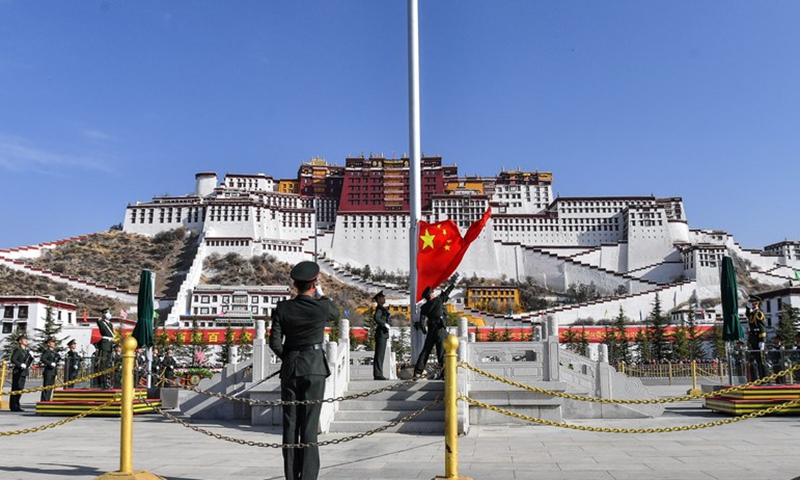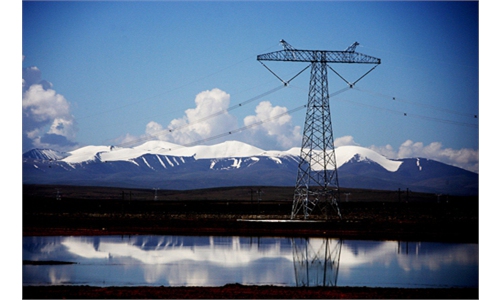US politicians play 'Xizang cards' to pressure China ahead of winter games
Hard-line anti-China politicians lose by showing paranoid mentality: expert

A flag-raising ceremony is held to celebrate the Serfs' Emancipation Day at the square in front of the Potala Palace in Lhasa, capital of southwest China's Tibet Autonomous Region, March 28, 2021.(Photo: Xinhua)
Hyping human rights issues, proposing meetings between the US President and separatists from China, and inciting a so-called boycott of the Beijing Winter Olympics, US politicians are racking their brains in playing all cards with China's Xinjiang and Xizang regions in order to push for tougher policies against China, but experts said those who are eager to play all these cards would lose fast after US politicians proposed a meeting between US President Joe Biden and the 14th Dalai Lama, who was a political exile and was engaged in anti-China separatist activities outside China.
More than 60 members of the US Congress sent letters to US Undersecretary of State Uzra Zeya, urging the Biden administration's presumptive Tibet Coordinator to push for a meeting between Biden and the Dalai Lama and end the practice of "calling Tibet part of China," Business Standard reported on Wednesday.
The report said that the letters are the latest sign of Congress intensifying its interest in China's Xizang region. Zeya's appointment as special coordinator for Tibetan matters in the US State Department is expected soon.
Some US politicians are keen on hyping China-related issues and it is not strange to see them hype topics related to Xizang. They chose to send letters to Zeya, who may be the new coordinator on Xizang-related affairs to show their importance on the matter of Xizang and Xinjiang, Jia Chunyang, an expert at the China Institutes of Contemporary International Relations, told the Global Times.
Competition between China and the US is intensifying and "battles" on topics related to China's Xizang, Xinjiang, Hong Kong and Taiwan are fierce. These US hawks are also pressuring the Biden administration to be tougher on those issues to China, Jia noted.
Marco Rubio and Patrick Leahy in the Senate and Jim McGovern and Chris Smith in the House led the letters, Business Standard reported.
Rubio is a hardline anti-China senator who has been calling for the closure of all Confucius Institutes in the US, as well as suggesting cracking down on Chinese high-tech companies. He has also been meeting "Tibet independence" separatists and promoting the "Hong Kong Human Rights and Democracy Act," experts noted.
Jia also noted that the last time Xizang topics were intensively hyped was in 2008, before the Beijing 2008 Olympics. This coincided with the current situation when the US just announced not to send officials to the Beijing Winter Olympics, citing "genocide" allegations in China's Xinjiang region.
On December 6, White House Press Secretary Jen Psaki said that the Biden administration will not send any diplomat or official representation to the Beijing 2022 Winter Olympics and Paralympic games, citing "genocide" and "crimes against humanity" in Xinjiang and "other human rights abuses." However, the Chinese Foreign Ministry reiterated that China had no plans to invite any US official to the Games, saying that the so-called "boycott" by the US is a political stunt.
Before the 2008 Beijing Olympics, separatists related to the Dalai clique disturbed the Olympic torch relay in Europe.
Recently, echoing the US, separatists from China's Xinjiang region and the US-backed separatist and terrorist World Uyghur Congress have been actively hyping topics on "boycotting" the Beijing Winter Olympics on overseas social media and are pressuring more countries to join the US in making a "boycott" announcement. However, more countries with rationality refuse to politicize the Olympics.
The Trump administration used to play more cards on Xinjiang, Taiwan and Hong Kong, but US politicians preferred to play all cards the US had on hand, experts said, noting that such moves showcased their paranoid mentality.
The purpose of the US congressmen's actions is to make trouble for China, to continue to attack China over so-called "human rights" issues, to exert all kinds of pressure on China, and to continue to vilify China on human rights by using Xizang and Xinjiang related affairs, Zhu Feng, a professor of international relations at Nanjing University, told the Global Times.
In the context of China-US strategic competition, the US Congress also plays some special role in diplomacy - it uses the state apparatus to intervene, suppress and drum up noise and pressure on other countries. This is not the first time for the US to adopt laws and policies that interfere in China's internal affairs, Zhu noted.
"As a place full of anti-China hawks, the US Congress has continuously intensified its attacks on Xizang and Xinjiang and China's human rights issues," said Zhu.
On Tuesday, the US House of Representatives passes legislation to ban imports from China's Xinjiang region over "concerns about forced labor." The House last week passed its version of the bill but that measure failed to advance to the Senate. The Senate is expected to pass the compromise version soon, sending it to the White House where Biden has said he will sign it into law, Reuters reported on Tuesday.


